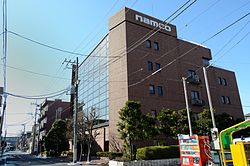
Back نامكو Arabic نامكو ARZ Namco AST نامکو AZB Namco Catalan Namco Danish Namco German Namco Spanish Namco Basque نامکو Persian
Logo (reused by Bandai Namco Amusements for its arcade chain of the same name) | |
 Headquarters in Ōta, Tokyo | |
Native name | 株式会社ナムコ |
|---|---|
Romanized name | Kabushiki-gaisha Namuko |
| Formerly |
|
| Company type | Subsidiary |
| Industry | Video games |
| Founded | June 1, 1955 |
| Founder | Masaya Nakamura |
| Defunct | March 31, 2006 |
| Fate | Merged with Bandai's video game operations to form Namco Bandai Games |
| Successor | Bandai Namco Entertainment |
| Headquarters | , Japan |
Area served | Worldwide |
Key people |
|
| Products | Video games |
| Parent | Namco Bandai Holdings (2005–2006) |
| Divisions |
|
| Subsidiaries |
|
| Website | https://bandainamco-am.co.jp/ |
Namco Limited[a] was a Japanese multinational video game and entertainment company founded in 1955 which operated video arcades and amusement parks globally, produced video games, films, toys, and arcade cabinets. They were one of the most influential figures in the worldwide coin-op and arcade game industry; Namco produced several multi-million-selling game franchises, such as Pac-Man, Galaxian, Tekken, Tales, Ridge Racer, and Ace Combat. In 2006, Namco merged with Bandai to form what is now named Bandai Namco Holdings; the standalone Namco brand continues to be used for video arcade and other entertainment products by the group's Bandai Namco Amusements division.
The Namco name comes from Nakamura Manufacturing Company, derived from its founder Masaya Nakamura. In the 1960s, it manufactured electro-mechanical arcade games such as the 1965 hit Periscope. It entered the video game industry after acquiring the struggling Japanese division of Atari in 1974, distributing games such as Breakout in Japan. The company renamed itself Namco in 1977 and published Gee Bee, its first original video game, a year later. Among Namco's first major hits was the fixed shooter Galaxian in 1979. It was followed by Pac-Man in 1980. Namco prospered during the golden age of arcade video games in the early 1980s, releasing popular titles such as Galaga, Xevious, and Pole Position.
Namco entered the home market in 1984 with conversions of its arcade games for the MSX and the Nintendo Family Computer, later expanding to competing platforms, such as the Sega Genesis, TurboGrafx-16, and PlayStation. Namco continued to produce hit games in the 1990s, including Ridge Racer, Tekken, and Taiko no Tatsujin, but later endured financial difficulties due to the struggling Japanese economy and diminishing arcade market. This led to the 2005 announcement of a merge with toy maker Bandai, which was completed in 2006 as Namco Bandai Holdings; Namco's former video games division was merged into a subsidiary of the holdings company, Namco Bandai Games, now called Bandai Namco Entertainment. Namco is remembered in retrospect for its unique corporate model, its importance to the industry, and its advancements in technology.
Cite error: There are <ref group=lower-alpha> tags or {{efn}} templates on this page, but the references will not show without a {{reflist|group=lower-alpha}} template or {{notelist}} template (see the help page).